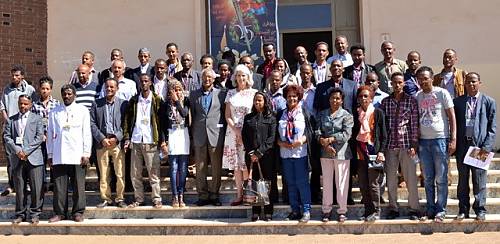Eritrea launches inventorying of intangible cultural heritage

Participants in the Intangible Cultural Heritage Inventory Workshop in Asmara, ? Merhawi Meaze On 3 April 2017, the Eritrean Commissioner of Culture and Sports, Ambassador Zemede Tecle, opened a two-week capacity-building workshop on community-based inventorying of intangible cultural heritage. This activity is part of the project “Strengthening the capacities of Eritrea for implementing the Convention for the Safeguarding of the Intangible Cultural Heritage”, financed by the generous contribution of the Government of Norway through the Intangible Cultural Heritage Fund.
The workshop runs from 3 to 18 April 2017 at the Commission of Culture and Sports in Asmara, Eritrea and with over 40 participants, including District Officers and community representatives from the nine ethno-linguistic groups of Eritrea. Mr Lovemore Mazibuko, a UNESCO trained international facilitator, leads the workshop with the support of Dr Senait Bahta, Professor of Anthropology and national expert. During the opening ceremony, the Ambassador confirmed that the UNESCO project is reinforcing national efforts and helping to ensure the safeguarding of Eritrea’s intangible cultural heritage. The elaboration of the first National Cultural and Natural Heritage Legislation, proclaimed on 30 September 2015, is already one significant achievement of these joint efforts.
Over the course of the workshop, participants receive theoretical and practical training on techniques for carrying-out a community-based inventory as well as photo and video documentation of intangible cultural heritage in view of preparing digital archives for Eritrea’s Research and Documentation Centre. Following the training workshop, Dr Bahta will lead local teams in undertaking a three-month fieldwork in community-based inventorying of intangible cultural heritage in the nine ethno-linguistic groups: Tigrina, Tigre, Saho, Rashaida, Nara, Bedawiet, Afar, Kunama, and Blin. Another workshop to train participants in applying for International Assistance from the Intangible Cultural Heritage Fund and preparing nominations will be held in September 2017.
Address: 81, Laiguangying West Road, Chaoyang District, Beijing, China
Zip Code: 100021
Tel: 86-10-64966526
Fax: 86-10-64969281
E-mail: [email protected]
NEWSLETTER
Leave us your e-mail address, we'll let you know about current events.


